
Table of Contents
Cervical Cancer
Cervical cancer is a type of cancer that affects the cervix, which is the lower part of the uterus that connects to the vagina. It is a common type of cancer that affects women, and it is caused by certain types of the human papillomavirus (HPV). In most cases, cervical cancer can be prevented through regular screenings and the HPV vaccine.
There are several risk factors that can increase a woman’s chances of developing cervical cancer. These include:
- HPV infection: As mentioned, certain types of HPV are the main cause of cervical cancer. These types of HPV can be transmitted through sexual contact, and they can cause abnormal changes in the cells of the cervix.
- Multiple sexual partners: Women who have had multiple sexual partners are at a higher risk of developing cervical cancer, as they are more likely to be exposed to HPV.
- Weak immune system: Women with a weakened immune system, such as those with HIV or AIDS, are more likely to develop cervical cancer.
- Smoking: Women who smoke are at a higher risk of developing cervical cancer, as the chemicals in tobacco can damage the DNA in cervical cells and increase the risk of cancer.
- Oral contraceptive use: Women who have used oral contraceptives (birth control pills) for a long time are at a higher risk of developing cervical cancer.
Read More – Gynaecological Cancer Screening in Gurgaon
There are several symptoms of cervical cancer that women should be aware of. These include:
- Vaginal bleeding: This can occur between periods, after sexual intercourse, or after menopause.
- Abnormal vaginal discharge: This may be thicker or have a different color or smell than usual.
- Pelvic pain: This may be a constant or intermittent pain in the lower abdominal area.
- Pain during sexual intercourse: This may be a sign of cervical cancer or other abnormalities in the cervix.
If you experience any of these symptoms, it is important to see a doctor as soon as possible. Cervical cancer can be treated successfully if it is detected early. Your doctor will perform a physical examination and may recommend a Pap test or HPV test to check for abnormal cells on the cervix. If abnormal cells are found, your doctor may recommend further testing, such as a biopsy, to determine if cancer is present.
There are several treatment options for cervical cancer, depending on the stage of the cancer and the overall health of the patient. These may include surgery, radiation therapy, and chemotherapy. In some cases, a combination of these treatments may be recommended.
Preventing cervical cancer is important, and there are several steps that women can take to reduce their risk. These include:
- Getting the HPV vaccine: This vaccine can protect against the types of HPV that are most commonly associated with cervical cancer. It is recommended for girls and young women between the ages of 9 and 26.
- Getting regular Pap tests: Pap tests can detect abnormal cells on the cervix, which can be treated before they turn into cancer. It is recommended that women get a Pap test every 3-5 years, depending on their age and other risk factors.
- Using condoms: Condoms can help reduce the risk of HPV transmission during sexual intercourse.
- Quitting smoking: As mentioned, smoking can increase the risk of cervical cancer. Quitting smoking can help reduce this risk.
Read More : Endometrial Thickness – What Is Its Normal Range In Pregnancy?
By taking these steps, women can greatly reduce their risk of developing cervical cancer. It is important to be aware of the causes and symptoms of cervical cancer, and to take steps to prevent it. If you have any concerns about your risk of cervical cancer, or if you experience any of the symptoms mentioned above, get in touch with Dr. Deepti Asthana today..!!



Leave a Reply